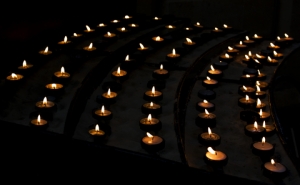For all those who say that the Bible has nothing to teach us, I say, “Read Job.”
 Here is an open wound kind of story, a lament and a waiting, “Why? Why me? Why?” Job really tries not to complain. He simply and understandably wants answers to the injustice of it all. Job is sore for the salve that most of the Bible ladles out…and there is none. Words of comfort and declaration of God’s mercy never come. Instead, grief and anguish rush deeply into every sinew of Job’s pain wracked body.
Here is an open wound kind of story, a lament and a waiting, “Why? Why me? Why?” Job really tries not to complain. He simply and understandably wants answers to the injustice of it all. Job is sore for the salve that most of the Bible ladles out…and there is none. Words of comfort and declaration of God’s mercy never come. Instead, grief and anguish rush deeply into every sinew of Job’s pain wracked body.
Job is blameless and upright. He does all the right things. He is faithful to his wife, they have seven sons and three daughters. He rises early each morning to perform a good ritual, mixing herbs and sending up prayers, burnt offerings, so that his children will be protected against bad karma, so that they will be safe.
By all accounts, Job was a saint. Like so many friends and family we know who daily do the right thing, often the hard thing, without complaint.
He is the parent who daily prepares the injections for his chronically ill child, nurses the one with cancer, carries the one with cystic fibrosis, and soothes the one with a chemical imbalance. It is love, this duty. It is all the hope that if they do everything right, all will end well.
God is pretty well pleased to be sure. But then he gets talking to the devil (never a good idea) about what a great guy Job is. And the Devil says: “Yeah, so what if he is your poster child for Righteous Living. He leads a charmed life. You’ve put a fence around him. Let me at him: we’ll see how long it is before he starts hatin’ on you.”
So God says, “Go for it.” The devil kills all 10 children. Still Job does not sin, does not rail mightily against God.
 God starts bragging to Job again. The devil replies, “He did all right, I’ll grant you, but let me get at his physical body, and I’ll turn him.” A nasty (that’s putting it mildly) skin disease is unleashed.
God starts bragging to Job again. The devil replies, “He did all right, I’ll grant you, but let me get at his physical body, and I’ll turn him.” A nasty (that’s putting it mildly) skin disease is unleashed.
For the next 30 chapters or so, Job and his four friends try to figure this out. This is not fair, this does not make sense. His friends even go so far as to intimate that perhaps Job needs to review his life, that maybe he didn’t something wrong that he is not even aware of and this is God’s punishment. Job is not buying it. On top of all he has suffered, now others want to heap blame on him to boot.
He is resentful, protesting God, he reads happiness in the Psalms and finds all the goody-two-shoes of the Bible hollow and a mockery of his pain.
He begins to build a legal case against God. God vs. the people. Job is a hiccup in a book of praising God and a vital one. Because sometimes you simply can’t kiss the ground with gratitude. Some things you go through not only knock the wind out of you, for good measure, they throw you down a well of hurt that takes more than a hot minute to climb out of.
 That’s why this book of Job so significant. Because you do not have to deny your life experience, round off its rough edges, and tiptoe, kowtowing with false deference to the Almighty. You can have faith in all its messy and contradictory guises and be honest with how horrible are some of the things you have endured.
That’s why this book of Job so significant. Because you do not have to deny your life experience, round off its rough edges, and tiptoe, kowtowing with false deference to the Almighty. You can have faith in all its messy and contradictory guises and be honest with how horrible are some of the things you have endured.
At the end of Job, the LORD answers Job “out of the whirlwind” and it is mesmerizing and mysterious and unfathomable. God’s response does not negate or dismiss his pain, but puts him face to face with the awe-inspiring mystery of all of creation with all its immensity and grandeur.
At the end of all the protest and anger and confusion, Job begins to hear the old strains of his faith, the words and music and traditions that had once soothed and he sees them differently, with fresh eyes. He has developed a stance towards life without a ‘tit for a tat’ expectation of anyone, including God.
And so it is with me. I don’t take the bible stories literally as I did when I was a little girl. Yet metaphorically their stories continue to enrich my own inner life. The songs I sing at church are not with the same lightheartedness I sang them as a kid, but they can and do make me laugh and cry at the same time.
 Job does not give neat little answers about why God is so great. In fact, he understands less than when he started. He knows he lost too much, that he didn’t deserve any of the things that befell him.
Job does not give neat little answers about why God is so great. In fact, he understands less than when he started. He knows he lost too much, that he didn’t deserve any of the things that befell him.
And while he can easily be let off the hook to be bitter and twisted for the remainder of his days, he chooses to be drawn back into the incomprehensible grandeur of life, with new eyes, eyes wide open.
 What about a headpiece to help you to train your brain? As mindfulness continues to gain acceptance as an integral part of a healthy lifestyle, it too has become lucrative fodder for inventors and investors who see its potential amidst the big business wellness industry.
What about a headpiece to help you to train your brain? As mindfulness continues to gain acceptance as an integral part of a healthy lifestyle, it too has become lucrative fodder for inventors and investors who see its potential amidst the big business wellness industry.























